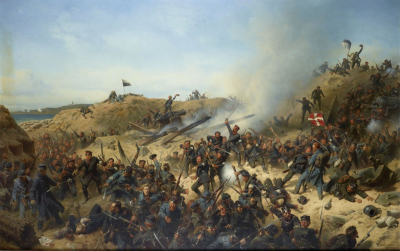The Battle of Heligoland (or Helgoland) was fought on 9 May 1864, during the Second Schleswig War, between a Danish squadron led by Commodore Edouard Suenson and a joint Austro-Prussian squadron commanded by the Austrian Commodore Wilhelm von Tegetthoff. The action came about as a result of the Danish blockade of German ports in the North Sea; the Austrians had sent two steam frigates, SMS Schwarzenberg and Radetzky, to reinforce the small Prussian Navy to help break the blockade. After arriving in the North Sea, Tegetthoff joined a Prussian aviso and a pair of gunboats. To oppose him, Suenson had available the steam frigates Niels Juel and Jylland and the corvette Hejmdal.
On the morning of 9 May, the two squadrons encountered each other off the island of Heligoland, then controlled by neutral Great Britain. Tegetthoff attacked with his two frigates while the slower Prussian vessels lagged behind, unable to effectively engage the Danish warships. Tegetthoff's flagship, Schwarzenberg, bore the brunt of the Danish gunfire and caught fire three times, the last of which could not be put out quickly and forced Tegetthoff to seek shelter in the neutral waters around Heligoland. Though Denmark claimed a tactical victory in the battle, the Danes were forced to end the blockade of the German coast. An armistice came into effect three days after the Battle of Heligoland. By the time fighting broke out again in June, further Austrian warships had arrived to strengthen the Austro-Prussian naval forces, and the Danes did not seek to challenge them.
Historians' opinions on the outcome of the battle are mixed, with some citing the withdrawal of Tegetthoff's ships, and the greater damage they sustained, as evidence of a tactical victory for Suenson. Other naval historians cite the lifting of the blockade as a strategic victory for the Austrians and Prussians, and others still describe the battle as inconclusive. The Battle of Heligoland was the last naval battle fought by squadrons of wooden ships, and it was also the last time Danish warships fought a major action. Jylland is preserved in Ebeltoft, the last surviving wooden-hulled, screw-driven warship.
The Second Schleswig War (Danish: Krigen i 1864; German: Deutsch-Dänischer Krieg) also sometimes known as the Dano-Prussian War or Prusso-Danish War was the second military conflict over the Schleswig-Holstein Question of the nineteenth century. The war began on 1 February 1864, when Prussian and Austrian forces crossed the border into Schleswig. Denmark fought the Kingdom of Prussia and the Austrian Empire. Like the First Schleswig War (1848–1852), it was fought for control of the duchies of Schleswig, Holstein and Lauenburg, due to the succession disputes concerning them when the Danish king died without an heir acceptable to the German Confederation. The war started after the passing of the November Constitution of 1863, which integrated the Duchy of Schleswig into the Danish kingdom in violation of the London Protocol.
The war ended on 30 October 1864, with the Treaty of Vienna and Denmark's cession of the Duchies of Schleswig (except for the island of Ærø, which remained Danish), Holstein and Saxe-Lauenburg to Prussia and Austria.

1864May, 9
Second Schleswig War: The Danish navy defeats the Austrian and Prussian fleets in the Battle of Heligoland.
Choose Another Date
Events on 1864
- 29Apr
Rensselaer Polytechnic Institute
Theta Xi fraternity is founded at Rensselaer Polytechnic Institute, the only fraternity to be founded during the American Civil War. - 5May
Battle of the Wilderness
American Civil War: The Battle of the Wilderness begins in Spotsylvania County. - 7May
Battle of the Wilderness
American Civil War: The Army of the Potomac, under General Ulysses S. Grant, breaks off from the Battle of the Wilderness and moves southwards. - 7May
City of Adelaide (1864)
The world's oldest surviving clipper ship, the City of Adelaide is launched by William Pile, Hay and Co. in Sunderland, England, for transporting passengers and goods between Britain and Australia. - 7Sep
William Tecumseh Sherman
American Civil War: Atlanta is evacuated on orders of Union General William Tecumseh Sherman.

 English
English  español
español  français
français  português
português  русский
русский  العربية
العربية  简体中文
简体中文 